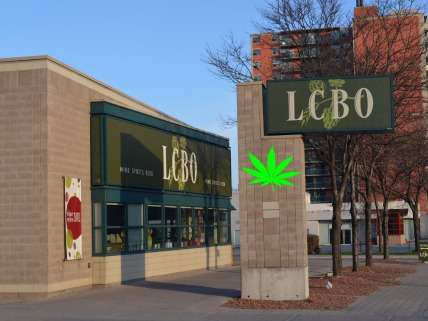Canadian Panel Reportedly Recommends Low Marijuana Taxes and Purchase Ages
A task force emphasizes the importance of displacing the black market.

The task force charged with advising the Canadian government about how to legalize marijuana delivered its report this week. Although the report won't be released to the public until December 21 or thereabouts, National Post columnist John Ivison has the scoop on its major recommendations. It sounds like the panelists learned from some of the mistakes made in Colorado and Washington—in particular, the policies that have helped preserve a black market.
"The key recommendation of the panel charged with outlining the framework for Canada's legal marijuana regime is that the system should be geared toward getting rid of the $7-billion-a year black market," Ivison writes. "All the other recommendations flow from that guiding principle."
The task force cautions against prioritizing revenue from marijuana taxes, which has been a major selling point for legalization measures in the U.S., because high tax rates make legal merchants less competitive with black-market dealers. "To eat into the black market," Ivison says, "the report is expected to recommend prices should be lower than the street price of $8-$10 a gram."
That's $6 to $7.50 in U.S. dollars, which is substantially lower than the prices typically charged by state-licensed retailers in Colorado and Washington. Grams at Medicine Man in Denver, for example, currently range from $12 to $14 (including taxes). Uncle Ike's in Seattle offers a "cheap pot" special for $7 a gram, but prices otherwise range from $10 to $19.
Concerns about a lingering black market also inform the task force's recommendations concerning a minimum purchase age. "Provinces will set the legal age for marijuana consumption," Ivison writes, "but the report is likely to recommend the limit be the age of majority—18 in six provinces; 19 in B.C., Newfoundland and Labrador, Nova Scotia, New Brunswick and the three territories—which would keep many young people from turning to criminal sources."
In the U.S., by contrast, all eight states that have legalize marijuana for recreational use have set the minimum age for buying, possessing, and consuming cannabis at 21, the same as the purchase age for alcohol. That decision exposes adults younger than 21 to criminal penalties for harmless activities (such as passing a joint) that are legal for their slightly older friends and siblings. It also helps keep the black market alive as a source of pot for college-age cannabis consumers who are not allowed to patronize legal retailers.
Another consumer-friendly policy reportedly recommended by the task force would allow home delivery of cannabis by mail, the way medical marijuana is currently distributed in Canada. Home delivery was not part of the first four state legalization initiatives approved in the U.S., but it was included in the measures that passed in California and Massachusetts last month. Each Canadian province will decide whether marijuana should also be available from storefronts. Ivison notes that Ontario might sell marijuana at its provincially owned liquor stores, although that idea is controversial among people who worry about encouraging consumers to mix bud with booze.
Prime Minister Justin Trudeau's government won't necessarily follow the task force's recommendations. It is expected to introduce legislation next April, and legal recreational sales could start as soon as January 2018.


Show Comments (24)